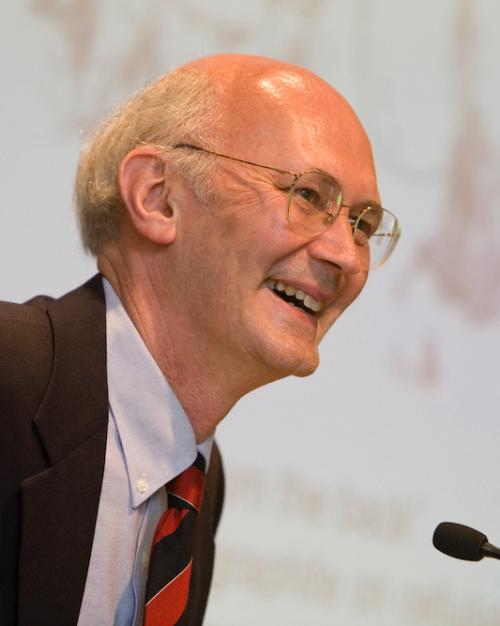Charles “Chip” Aquadro, the Charles A. Alexander Professor of Biological Sciences in the College of Arts and Sciences, has been awarded the 2022 Society of Molecular Biology and Evolution (SMBE) Lifetime Research Achievements Award in recognition of his decades of exceptional contributions to population genetics.
"This award is the highest honor given by SMBE and places Chip in the company of the greatest contemporary leaders in molecular evolution and evolutionary genetics," said Daniel A. Barbash, chair and professor of molecular biology and genetics in the College of Agriculture and Life Sciences. Aquadro holds a primary appointment in the the Department of Molecular Biology and Genetics and a joint appointment in the Department of Ecology and Evolutionary Biology.
Aquadro is a world leader in the study of population genetics of the fruit fly, Drosophila melanogaster. His research focuses on discovering basic principles that determine the amount of diversity that exists within and between the genomes of organisms; and how we can use that diversity to understand organismal evolution, to discover novel genes, to maximize human health and to advance agriculture.
Through both experimentation and statistical analysis, Aquadro explores DNA sequence variation and evolution. His frequent subject is the fruit fly, but he and his lab have also focused on humans, viruses, plants, horses, naked mole rats, birds and fish.
Aquadro’s important discoveries include the positive correlation between the regional rate of recombination of a gene region and its level of nucleotide variation, and further investigations into the potential role of natural selection in driving that correlation. This 1992 paper in Nature is Aquadro’s most cited work, initiated in collaboration with his then-Ph.D. student David Begun, now a professor at the University of California Davis.
Throughout the 1980s and 1990s, Aquadro published a series of highly influential papers analyzing DNA variation in diverse regions of the genome of D. melanogaster, revealing surprising patterns of DNA variation including transposable element insertion in the genome and the molecular and evolutionary processes that shaped that variation for the first time at such a fine scale. This approach soon gave way to DNA sequencing; in the period when these papers pointed the way toward a rich collision between detailed empirical measurements of DNA variation and population genetics theory, Aquadro was one of the leaders.
Most recently, Aquadro has developed and applied functional tools and analyses to test population genetic predictions of strong natural selection on germline stem cells in several species of Drosophila.
A dedicated educator, Aquadro teaches population genetics and personal genomics and medicine. He taught the core Population Genetics course at Cornell for 29 years before developing and shifting his efforts to Personal Genomics and Medicine class which enrolls 130 undergraduate students from across the university each spring.
Aquadro started as a faculty member at Cornell in 1985 after serving as a postdoctoral fellow in the Laboratory of Genetics, National Institute of Environmental Health Sciences. He earned a PhD in population genetics at the University of Georgia, Athens, an MS in zoology at the University of Vermont, Burlington, and a BS in biology at St. Lawrence University. He has served as a scientific advisor to science television, including NOVA, WGBH and the Discovery Channel.




